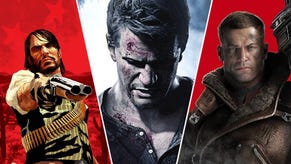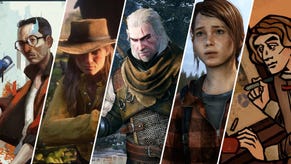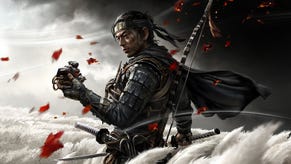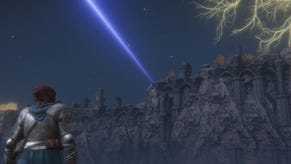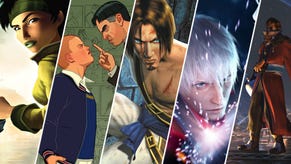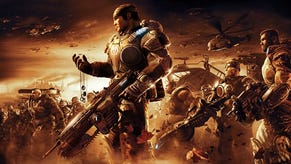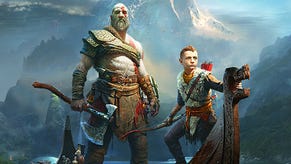God of War Director Cory Barlog Briefly Considered Teaming Kratos With His Wife Rather Than His Son
INTERVIEW | God of War director Cory Barlog on the role of Atreus' mother, Kratos' middle-aged god phase, and that pesky jump button.
This article first appeared on USgamer, a partner publication of VG247. Some content, such as this article, has been migrated to VG247 for posterity after USgamer's closure - but it has not been edited or further vetted by the VG247 team.
How do you evolve Kratos? The answer seems to be to pair him with someone else—his son in this case. But according to director Cory Barlog, there were other ideas on the table when he first started sketching out his God of War revival.
"Some of the first stuff I was looking at was Kratos and his wife being the center of the story," Barlog told USgamer last week, "but what I ended up with was mirroring my own life in having my son."
While it doesn't seem to have been much more than an early concept, it would have made for an interesting change in dynamics from the original trilogy. What would Kratos be like around a life partner who is his equal? Maybe we'll get a glimpse in the final game.
In chatting with Barlog about God of War, we also covered its similarities with Last of Us, the optional areas, and the tough times that Sony Santa Monica went through in the lead up to God of War. Read on for the full interview.
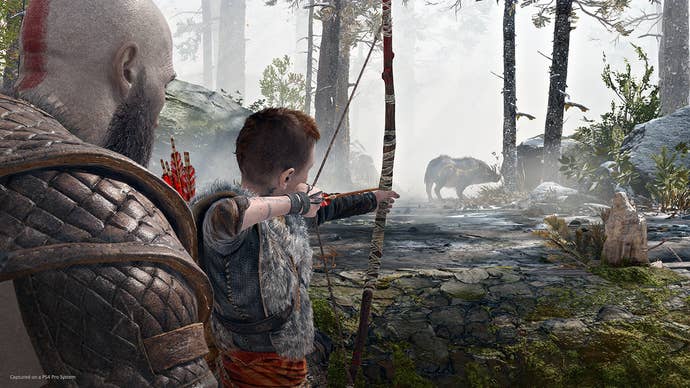
Something I found interesting was the similarities to Last of Us in the roadtrip, the father-son bond, that sort of thing. I was wondering if you could speak to that.
Cory Barlog: It's interesting because I think at its highest level you can look at the father figure looking after their child as well as the closer camera angle. But for me the game is so vastly different. Not to say anything negative about The Last of Us, because the game is amazing, but the way we handle Atreus and his gameplay relationship to the player is very different. It was very important for me to carve out our own identity in how we approached this game.
I found it interesting that you Kratos' second wife is dead, since his first wife died as part of the original game's backstory. Why did you decide to go back to that thematic well, as it were?
CB: As I looked at Kratos and Atreus, to be able to tell a really compelling story about these two characters, not only from the mythological aspect, they had to be isolated. For Kratos to find some kind of emotional core, he needed to have a strong connection to a single character. Some of the first stuff I was looking at was Kratos and his wife being the story, but what I ended up with was mirroring my own life in having my son.
You go through a lot of things during that process, and Kratos' past history of being a pretty terrible father, and also having terrible role models for fatherhood—he has had no fatherly role models that help him understand what it is to be a father—so he is truly like myself feeling around in the dark. Creatively, you don't know where you'll end up on any journey you go on, and you sort of hope that there's a light switch somewhere. For me that was very important.
I think a lot of people look at it cynically, like it's a trope. The angst over the dead wife trope. I think it's terrible that people do that. What it says that you are not allowed to do the story in the way you want to do it, it says that you are going to do the story in the way that I tell you to do it. What's interesting about this story is that you find out so much about the boy's mother through how they speak. She acts as a conduit for them to open up to each other. She is an invisible force that is omnipresent and constantly there with them.
I wanted [Kratos] to understand that part of how you grow is how you deal with grief. Kratos is like a machine. In some ways, everyone looks at Kratos, and this is what we see. He's this one dimension: rage. But there's so much more when you look at it from a different perspective. This one to me is looking into the depths of the individual and discovering what it would take to make Kratos actually legitimately have a true moment of humanity. What does that journey look like?
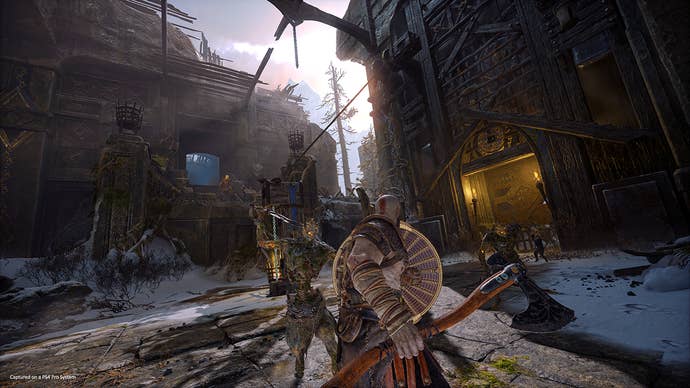
When it was revealed back in January that there would be no jump button, there was a lot of discussion about the decision. Could you tell me some of the subtle ways that its removal has impacted the gameplay?
CB: I'm guilty of this so I'm not criticizing anybody, but there's this sort of pavlovian button pressing where you're rolling and jumping, rolling and jumping, and they end up playing in a way that's totally annoying to the rest of the combat team. In a God of War 2 meeting I would be playing the game, and they would be behind me, and they would be like, "Could you stop jumping?" And I couldn't. Pressing the X button was like a food pellet button for me.
It kind of gives people a different sort of way to look at the game. Instead of moving from encounter to encounter and jumping and jumping, you still have this two stage input—the quick tap to get out of the way and the double roll. Grounding it in that sense is saying that jumps exist in certain contexts, but I think it's more freeing from a strategic standpoint because it creates a more decisive, more measured approach to the gameplay.
Jump combos are wonderful, and I was an advocate for them. When I arrived on God of War 1 there was no jump combat, there was no grabbing a guy in the air and slamming him to the ground. I added all that and I fought to put it in. But as I looked at what we were going to do on this game, I realized that we don't necessarily need it. It's a great thing, it's fun, but does it tell the story from a gameplay perspective of somebody who's in the "middle-aged god phase?" He's more measured now, he's more thoughtful, and he's more strategic. We didn't slow the game down arbitrarily. We did it to show that he's more competent, he's smarter. Because when I returned here, I realized that I made decisions in a different way. I'm older, I look at the world in a different way, and I'm surrounded with people who worked on God of War 1 who are all older. We've marveled at the fact that the way we used to make games was with a chip on our shoulder, thumb our nose at the man, prove everyone wrong.
We have a little bit of that, but we also have wisdom. We've all seen much more. It's richer because we understand more.
There's a moment where I totally thought Kratos was going to twist an enemy's head off because he's done that in every other God of War, but instead he just breaks his neck. Was that to show that Kratos has mellowed?
CB: There's a lot of circumventing expectations by suggesting that we'll go one way, then going another. That sets the tone and shows that we're going to be looking at everything different. Even after that moment of breaking the neck he's tired. He's still laying on the ground to collect himself, then struggles through the walk back. He's older, he hasn't gotten into fights like that in a long time, and he's kind of shaking off the cobwebs
He has to put on the old face that he's worn before, but he needs to try and progress forward. Prior to this he's been struggling, failing over and over again to control the monster inside him. All the previous games he's the monster 24/7, which is fine, but the reality is that there wasn't a single person out there who found that super compelling by the time we reached the fourth, fifth, sixth game.
Is it fair to say that the old, over-the-top Kratos is outdated now? Is that from a different era of the industry?
CB: I think Kratos in his original incarnation reflected how we viewed things and the time period. The time period had not a lot of anti-hero icons, and it kind of began something in a way. Over time, though, things change. They need to change. I'm not the same person I was 20 years ago. I don't think he should be either. But I think he's a lot of the reflection of us: who [David Jaffe] was, who I was, who the team was.
I think it's interesting because a lot of what we've done is also a little bit of a reflection of the industry. You look at movies of the 20s, the 30s, when they were kind of at their beginning, and then you look at the sophistication of movies today. Look at some of the best examples of cinema today and compare them to the complexity of the best movies of the 30s, and you see that there's a growing willingness to look at the whole picture as opposed to being enamored with making a movie with sound and color.
We don't have the advantage of having 120 years of history. We're still in the early days. We're on the tipping point where we are asking why we're doing something. We're looking at context and actually challenging audiences to experience the full range of human emotion.
You've previously alluded to being able to go back and fight optional bosses and explore different areas. What exactly will that look like?
CB: I didn't realize that optional bosses would be so incendiary. Someone was like, 'Can you skip bosses,' and I was like, 'Sure.' You can't actually skip the main bosses, but as you go and explore the world, one of the main driving forces of exploration for me was rewarding curiosity. What I love about video games is this idea that I discovered something, that I can go to work and be like, "Did you know that you can do this?" And they'll go home and try to find it themselves. It's that kind of weird chain letter that circulates out as they experiment and find something.
But when it becomes so controlled and linear, everyone is experiencing the exact same thing. I really wanted to create this world that felt not like an open world, which is a term that I find charged with a lot of history. And that history comes from loading up an open world and finding a laundry list of tasks. That's the part that I don't want. The part that I like is, 'What's over there?' That feeling that if you go off the path, find something, and solve the puzzle to open the door, you can find an entire level that you might have missed.
It's an incredible challenge to tell the team that they are going to work on something that most people will never find. Most people don't like that. They get very angry, then it's a fight, and you have to get them to trust you. Everything connects, because it's the exploration of a world. The world is kind of a character here. And as you branch off on a path, you discover about mythology, you find a backstory for a character you've been talking to, maybe a bit of information for an event you only heard about tangentially. That sense of almost archaeologically uncovering bits of the world and the story is so rewarding within all video games, and I wanted to see if we could dig deeper and find as much as we could to wring every bit of fun out of every part of the world.

[Sony Santa Monica studio head Shannon Studstill] said that the period before the new God of War was kind of a dark time for the studio. I was wondering if you could speak to that.
CB: It was an interesting time to come back to. I had just finished Tomb Raider, and at the time I was set to direct the second Tomb Raider, but I realized that the first game was so good that I wasn't sure where I would go without completely changing things. So I had been in discussions with Shannon for a while about having another God of War story in me. I wasn't sure what exactly it would be, but I knew that I wanted to try something new.
When I got back, [Sony Santa Monica's] other project was in full swing, and when it didn't work out, it was hard on all of us. We had never experienced that level of getting knocked down. I do feel like we got knocked down twice. I felt a tremendous amount of responsibility because I had been part of the studio since basically the beginning. God of War 1 was when the studio really started to find its way, and I was part of that. So much of this studio is part of my own creative legacy, and it's important to me that we all stay on the path I feel we all want to be on.
I don't ever want to relive what we went through at that time. There were a lot of good people we don't get work with anymore because we went and made some decisions that we probably look back on and think we have to do better. That line, "Do better," has motivated us. There's no point in us worrying whether or not what we did was good or bad. We just need to do better, we need to push, and every single day be true to that vision we had. Accessibility, pick up and play, fun. Deliver on the promise of the back of the box.
That's why single-player games are awesome. I still feel like I have that experience that I had in school where would be like, 'I can't wait to get home. I'm going to get transported into this whole other world.' The fantastic fantasy movies from the '80s are still inspirations, like The Neverending Story. People look at me funny when I say it's an inspiration and are like, 'But that's a kid's movie.' And I'm like, 'No, it's an amazing movie!' It's an amazing complete world that is painting this fantastic picture of a world we don't know. Legend, Labyrinth, Ladyhawk—any movie from the '80s that had an 'L' in it. These movies were formative to me. And they still inspire me.
God of War will be out on PS4 on April 20 and you can get our thoughts in our God of War review.


